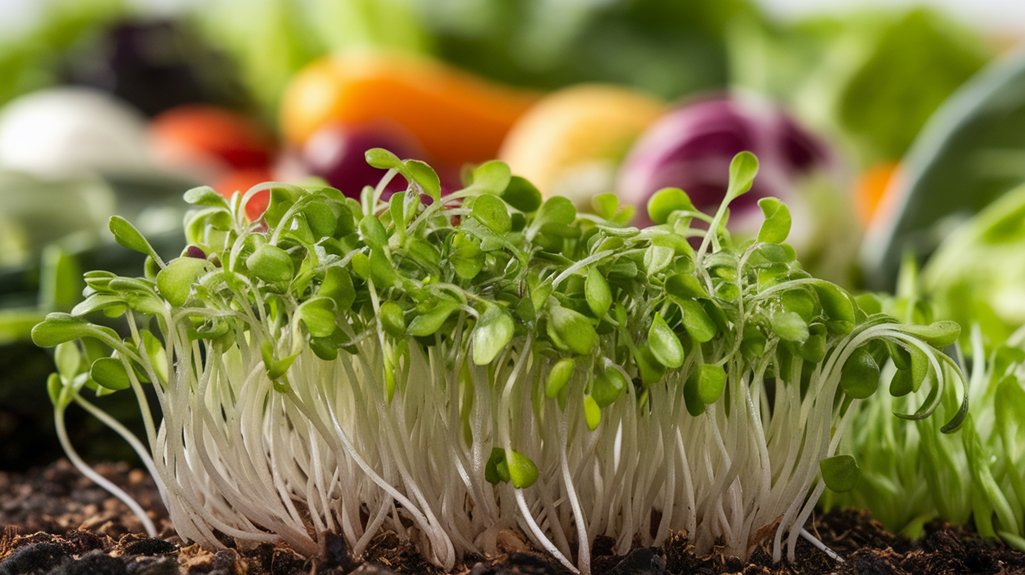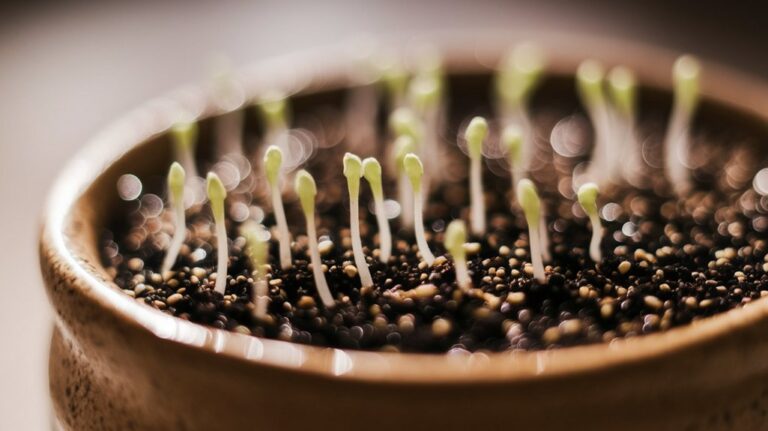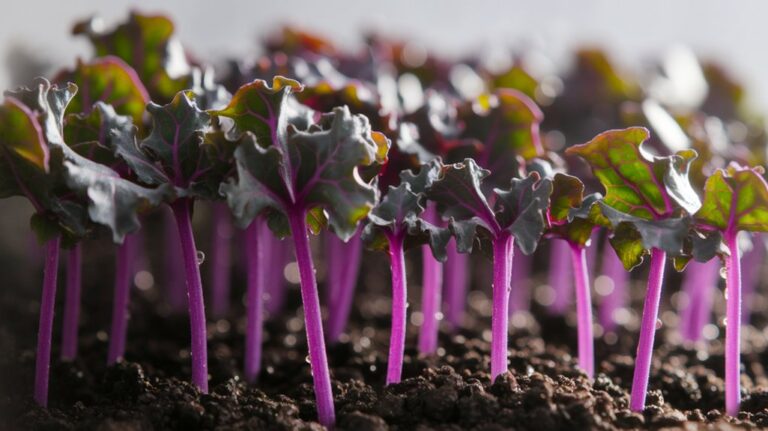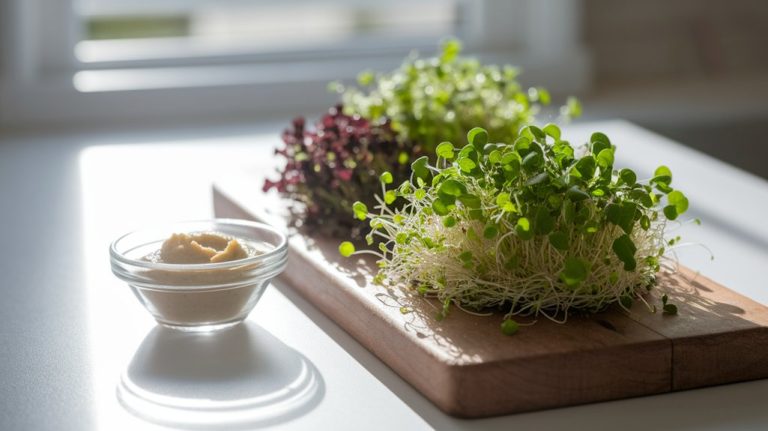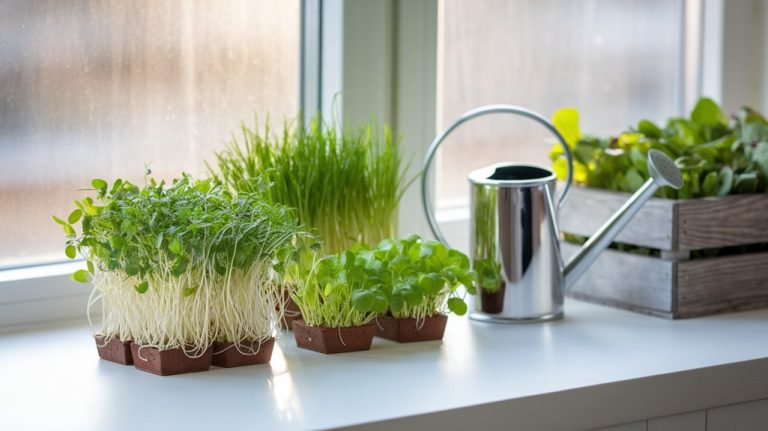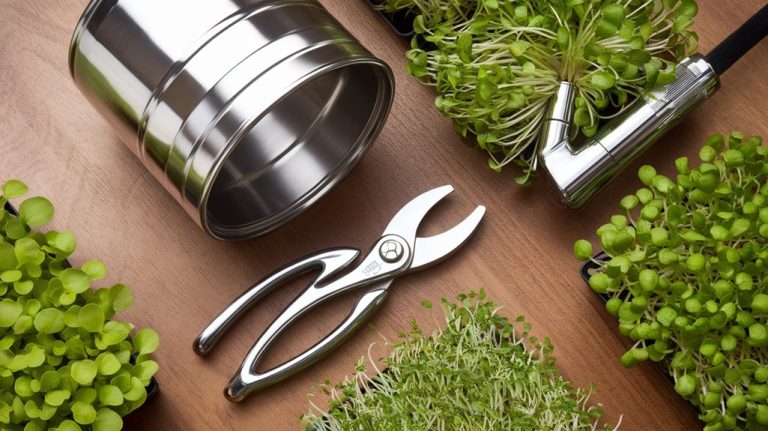The Science Behind Sprouts: What Makes Them a Superfood?
Sprouts are truly a superfood because they’re packed with essential vitamins and minerals. When seeds germinate, the sprouting process enhances their nutrient profile, activating enzymes that boost nutrient absorption. They’re rich in antioxidants that fight oxidative stress and inflammation, which can lower chronic disease risk. Plus, sprouts are easy on digestion, making nutrients more accessible. If you’re curious about how to incorporate these nutrient-dense foods into your meals, let’s explore some delicious options.
Key Takeaways
- Sprouts are nutrient-dense, providing essential vitamins, minerals, and antioxidants that promote overall health and support the immune system.
- The sprouting process enhances nutrient bioavailability, activating enzymes that break down complex carbohydrates and reduce anti-nutrients.
- Rich in antioxidants and phytochemicals, sprouts help combat oxidative stress and inflammation, potentially lowering chronic disease risk.
- Their high digestibility and reduced anti-nutrients make sprouts gentle on the gut while promoting nutrient absorption and healthy digestion.
- Sprouts can be easily incorporated into various dishes, enhancing flavor, texture, and nutritional content in salads, smoothies, and stir-fries.
The Nutritional Powerhouse: Key Vitamins and Minerals in Sprouts
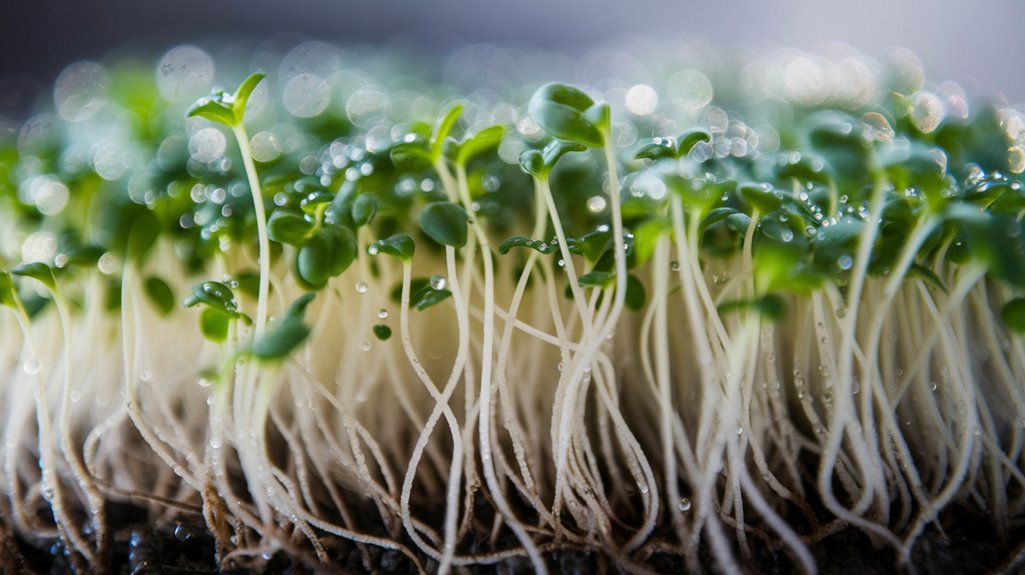
Sprouts are truly a nutritional powerhouse packed with essential vitamins and minerals. I often incorporate them into my meals for their impressive nutrient profile.
They’re rich in vitamin C, which boosts the immune system, and vitamin K, crucial for blood clotting and bone health. Additionally, sprouts provide a good amount of B vitamins, including folate, which supports cell division and brain health.
You’ll also find minerals like iron, necessary for oxygen transport in the blood, and magnesium, vital for energy production. Plus, their high fiber content aids digestion and promotes a healthy gut.
The Sprouting Process: How Germination Enhances Nutrients
When seeds undergo germination, they transform into sprouts, significantly enhancing their nutrient content. During this process, enzymes activate, breaking down complex carbohydrates into simpler sugars, making them easier to digest.
I’ve discovered that this transformation boosts the availability of vitamins, particularly B vitamins, and increases essential minerals like iron and zinc. The sprouting process also triggers the production of amino acids, which are vital for protein synthesis.
Furthermore, it reduces anti-nutrients, substances that can inhibit nutrient absorption. By soaking and sprouting seeds, I’ve found that I can enjoy a more nutritious food source that’s not only healthier but also tastier.
Sprouts are truly a remarkable example of how nature optimizes nutrition through a simple biological process.
Antioxidants and Phytochemicals: Protecting Your Health
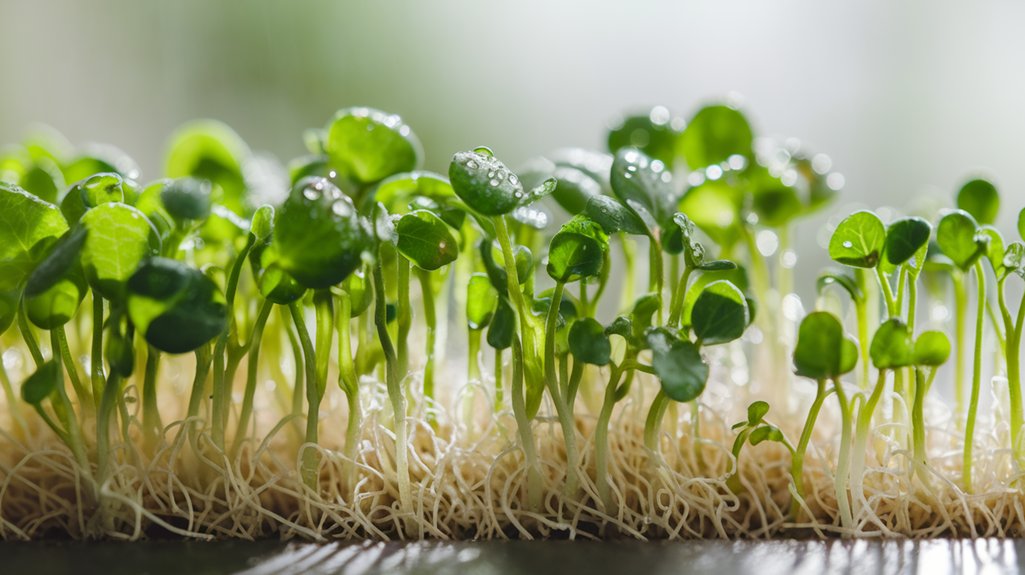
After exploring the incredible benefits of sprouting, it’s fascinating to note how these tiny greens are rich in antioxidants and phytochemicals that can protect our health. These compounds help combat oxidative stress, reduce inflammation, and may lower the risk of chronic diseases. I love incorporating sprouts into my meals, knowing they offer such powerful protective properties.
Here’s a quick comparison of some key antioxidants and phytochemicals found in popular sprouts:
| Sprout Type | Key Compounds |
|---|---|
| Broccoli | Sulforaphane |
| Alfalfa | Saponins |
| Mung Bean | Flavonoids |
| Radish | Anthocyanins |
| Lentil | Phenolic acids |
Digestibility and Absorption: Why Sprouts Are Easier on the Gut
Although many foods can be tough on the digestive system, I find that sprouts are remarkably gentle and easy to digest. Their higher water content and reduced anti-nutrients make them less taxing on the gut than many other foods.
Sprouting activates enzymes that break down starches and proteins, which enhances nutrient absorption. This process also reduces compounds like phytic acid, which can inhibit the absorption of minerals.
Additionally, the fiber in sprouts promotes healthy gut bacteria, aiding digestion further. I’ve noticed that incorporating sprouts into my meals leads to less bloating and discomfort.
Incorporating Sprouts Into Your Diet: Delicious Ways to Enjoy Them
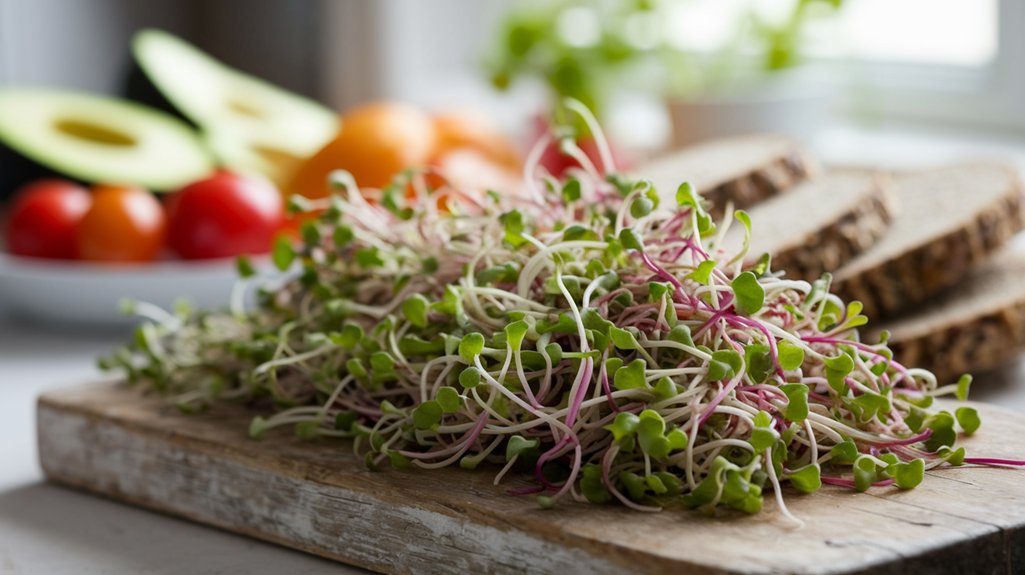
Incorporating sprouts into my meals not only enhances their nutritional value but also adds a delightful crunch and freshness that I love.
I’ve discovered several delicious ways to enjoy these superfoods, making them a staple in my kitchen. Here are my favorite methods:
- Salads: Toss a handful of sprouts into any salad for added texture and nutrients.
- Sandwiches: Layer sprouts in sandwiches or wraps for a crunchy bite.
- Smoothies: Blend sprouts into smoothies for a nutrient boost without altering the flavor.
- Stir-fries: Add sprouts at the end of cooking for a fresh finish.
- Garnishes: Use sprouts as a garnish for soups or dishes to enhance presentation and taste.
These simple additions make a significant difference in my meals!
Frequently Asked Questions
Can Sprouts Be Grown at Home Easily?
Absolutely, I’ve found that growing sprouts at home is surprisingly easy!
All you need are some seeds, water, and a jar or sprouting tray. I soak the seeds overnight, then rinse and drain them twice a day.
Within a few days, I’ve fresh, crunchy sprouts ready to enjoy.
It’s a simple process that requires minimal space and effort, making it perfect for anyone looking to add a nutritious touch to their meals.
Are There Any Risks Associated With Eating Raw Sprouts?
Yes, there are risks associated with eating raw sprouts. I’ve learned that sprouts can harbor harmful bacteria like E. coli and Salmonella, which can lead to foodborne illnesses.
While I enjoy them, I always make sure to buy them from reputable sources and wash them thoroughly.
Cooking sprouts can reduce these risks, so if you’re concerned about safety, consider lightly steaming them.
It’s better to be safe than sorry when it comes to food!
How Long Do Sprouts Typically Last in the Fridge?
Sprouts usually last about 5 to 7 days in the fridge if stored properly.
I always keep mine in a breathable container, like a perforated bag, to prevent moisture buildup.
It’s crucial to check for any signs of spoilage, such as an off smell or sliminess.
If you notice these, it’s best to discard them.
Enjoying fresh sprouts is great, but I make sure to consume them within that timeframe for the best quality!
Are All Types of Sprouts Equally Nutritious?
Not all types of sprouts are equally nutritious.
While I love adding alfalfa, broccoli, and mung bean sprouts to my meals, their nutrient profiles differ.
For instance, broccoli sprouts are packed with sulforaphane, known for its health benefits, while alfalfa sprouts offer a good source of vitamins and minerals.
When I choose sprouts, I try to mix different types for a balanced intake of nutrients, ensuring I get a variety of health benefits.
Can I Cook Sprouts, or Should They Be Eaten Raw?
You can definitely cook sprouts, but I prefer them raw for their crunch and vibrant flavor.
Cooking can soften them and change their taste, but it may also reduce some nutrients. If you do choose to cook them, steaming is a great option—it preserves more nutrients than boiling.
Ultimately, it’s about what you enjoy most. I often toss raw sprouts in salads or on sandwiches for a nutritious boost.
Conclusion
Incorporating sprouts into my diet has truly transformed my meals and health. Their impressive nutritional profile, enhanced by the sprouting process, makes them a fantastic addition to any plate. Plus, their antioxidants work hard to protect my body, while their digestibility keeps my gut happy. Whether I toss them in salads, blend them into smoothies, or use them as a topping, sprouts have become my go-to superfood for a nutritious boost. Give them a try!

